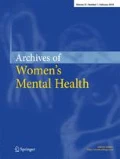Abstract
To investigate current policy and practice in postnatal depression in Scotland and to consider how effectively guidelines were addressed. A questionnaire survey of all National Health Service Boards in Scotland between September 2003 and February 2004 to determine what written policies for postnatal depression were in place as at September 2003. This was followed by a questionnaire survey of a representative sample of general practices in Scotland to determine the routine procedures in use for managing postnatal depression in general practice primary care teams. NHS Boards and general practices in Scotland, UK. Forty-seven per cent of policies and 68% of General Practices had implemented the majority of the Scottish Intercollegiate Guidelines Network 60 evidence based recommendations. Practices were more likely than NHS Boards to have addressed a higher percentage of the recommendations (p < 0.05). Practices were more likely to implement antenatal screening for a history of puerperal psychosis if they were within NHS Boards that recommend this as routine practice. Practices within NHS Boards that had in-patient facilities for mother and baby admissions were more likely to identify these services as a treatment option than in the areas where the NHS Boards indicated the facilities were unavailable. Board guidance did not relate significantly to the likelihood of practices following the other evidence-based recommendations. Minimum standards represented by the SIGN 60 evidence-based recommendations were mostly followed in both policy and practice. If Board policy followed guidelines, the guidelines were more likely to be implemented at primary care level.

Similar content being viewed by others
References
Andersson L, Sundström-Poromaa, Bixo M, Wulff M, Bondestam K, Âström M (2003) Point prevalence of psychiatric disorders during the second trimester of pregnancy: a population-based study. Am J Obstet Gynecol 189:148–154
Clark E, Donovan EF, Schoettker P (2006) From outdated to updated, keeping clinical guidelines valid. Int J Qual Health Care 18:165–166
Evans J, Heron J, Francomb H, Oke S, Golding J (2001) Cohort study of depressed mood during pregnancy and childbirth. Br Med J 323:257–260
Grimshaw JM, Thomas RE, MacLennan G, Fraser C, Ramsay CR, Vale L et al (2004) Effectiveness and efficiency of guideline dissemination and implementation strategies. Health Technol Assess 8(6):iii–iv 1–72
Health Scotland (2004) Ready steady baby: a guide to pregnancy, birth and early parenthood. Health Scotland, Edinburgh
Holden JM, Sagovsky R, Cox JL (1989) Counselling in a general practice setting: a controlled study of health visitor intervention in treatment of postnatal depression. Br Med J 298:223–6
Jarman B (1984) Underprivileged areas: validation and distribution of scores. Br Med J 289:1587–1592
Josefsson A, Sydsjö G (2007) A follow-up study of postpartum depressed women: recurrent maternal depressive symptoms and child behavior after four years. Arch Womens Mental Health 10:1434–1816
O’Hara MW, Swain AM (1996) Rates and risk of postnatal depression—a meta-analysis. Int Rev Psychiatry 8:37–54
Overill S (1998) What are integrated care pathways? J Integr Care 2:93–98
Rubertsson C, Waldenstrom UE, Wickberg B, Radestas I, Hildington I (2005) Depressive mood in early pregnancy and postpartum: prevalence and women at risk in a national Swedish sample. J Reprod Infant Psychol 23:155–166
Scottish Executive (2001a) Our national health: a plan for action a plan for change. Edinburgh Scottish Executive, Scotland
Scottish Executive (2001b) Framework for maternity services. Edinburgh Scottish Executive, Scotland
Scottish Executive (2001c) Scottish Executive: nursing for health: a review of the contribution of nurses, midwives and health visitors to improving the public’s health. SEHD, Edinburgh, Scotland
SIGN (2002) SIGN 60: postnatal depression and puerperal psychosis. Scottish Intercollegiate Guidelines Network, Edinburgh
Verkerk K, Van Veenendaal H, Severens JL, Hendriks EJ, Burgers JS (2006) Considered judgment in evidence-based guideline development. Int J Qual Health Care 18(5):365–369
Yelland J, McLachlan H, Forster D, Rayner J, Lumley J (2007) How is maternal psychosocial health assessed and promoted in the early postnatal period? Findings from a review of hospital postnatal care in Victoria, Australia. Midwifery 23:287–297
Acknowledgements
The study was funded by NHS Quality Improvement Scotland (project reference P02/03). The authors would like to thank Dr. Barbara Ballinger for her contribution to the study and the respondents in the NHS Boards and General Practices.
Author information
Authors and Affiliations
Corresponding author
Rights and permissions
About this article
Cite this article
Alder, E.M., Reid, M., Sharp, L.J. et al. Policy and practice in the management of postnatal depression in Scotland. Arch Womens Ment Health 11, 213–219 (2008). https://doi.org/10.1007/s00737-008-0015-8
Received:
Accepted:
Published:
Issue Date:
DOI: https://doi.org/10.1007/s00737-008-0015-8


